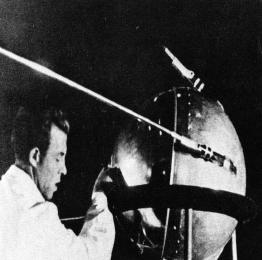
The Soviet Union was always up for a challenge and strived for new scientific exploration. They were the first state to set up drifting stations at the North Pole, and now they wanted to beat the United States by being the first ones to send something man-made into space.
During the race into space, the Soviet Union was originally trying to send Object D (Sputnik III) into space first in April 1958. However, the United States planned to launch the first American satellite on July 1, 1957. There’s no way the Soviet Union would let the US beat them into space, so they designed a much more simpler satellite. It was projected that this satellite would be launched in April-May 1957 with only essential equipment on-board.
On 4 October 1957, Sputnik was launched from the Tyuratam launch base in the Kazakh Republic. It weight 184 pounds and circled the Earth every hour and 36 minutes. It was visible with binoculars before sunrise and after sunset, and it transmitted a signal strong enough that amateur radio operators could listen to it. In January 1958, Sputnik’s orbit deteriorated and burned in the atmosphere.
The launch of Sputnik I was a major victory for the Soviet Union in the space, and everyone that worked on the project was praised by the country. The Soviet Union shocked the world, especially the US and the space race with them was ignited.
Sources:
https://www.history.com/this-day-in-history/sputnik-launched
http://www.russianspaceweb.com/sputnik_design.html
https://www.nasaspaceflight.com/2015/10/remembering-sputnik-satellite-space-race/
Image Source:
https://www.nasa.gov/multimedia/imagegallery/image_feature_924.html


Great post! I think it’s interesting how so much innovation essentially stemmed from competition, rather than scientific curiosity– I like how you mentioned that they launched a simpler object into space just in order to beat the US. What was the public reception to this orbit, in both the US and the USSR?
LikeLiked by 1 person
People from both the US and USSR had never seen anything like this before, and all wanted to witness it as it orbited around the Earth. The Russian people praised the scientists and engineers that worked on Sputnik I. However, in the US there were now military concerns. The rocket that launched Sputnik I in space meant that Russia had a rocket capable of hitting the US with a nuclear warhead.
LikeLike
Again with the hyperlinks! I liked that you pointed out how the Russians weren’t going to let the United States beat them; this competition drives the relationship between the two great powers. If I remember correctly, I think Russia sent a man to outer space before the United States as well.
LikeLiked by 2 people
They did
LikeLike
Very interesting! I did not know that Sputnik sent out a signal strong enough that amateur radio operators could listen. I think that space race is one of the most fascinating aspects of the Cold War!
LikeLike
And who ever said competition didn’t drive innovation? I am curious as to how much simpler the Soviets made their satellite in order to get it our quicker. Why is it being first is more important than being best?
LikeLike
If you look at the Russianspaceweb source I used, it has the blueprints of Sputnik I and goes in depth of what was/wasn’t included. I think being first was really important because no one has ever achieved anything like this before. They would eventually launch Sputnik II, which carried a dog, into space before the US.
LikeLike
What ?
LikeLike
That is the pettiest deadline they could have set, one month before the Americans were going to launch a satellite. I never actually knew what Sputnik was for, besides proving that man-made satellites could be put into orbit. Do you know what signal Sputnik was transmitting?
LikeLike
I also did a post on the Soviet space program, and I think it’s so crazy how caught off guard the Americans were about Soviet rocket technology. Considering the significance of what the Soviets having a rocket that could launch a nuke directly at American, I’m amazed they paid so little attention to the ICBM program before then.
LikeLike
Reading this post was a great break from all of the others about the agricultural expansion that was taking place. The Soviet space program was way ahead of its time (obvious in the fact that they were the firsts to break out of the Earth’s atmosphere). The response on the part of the US was the most significant outcome of this event however.
LikeLike